In Traditional Chinese Medicine (TCM), balance is the foundation of how you feel each day. When your Qi, the vital energy that moves through your body, flows freely, you feel calm, clear, and centered. When stress builds up, digestion slows, or sleep becomes restless, it shows that your natural rhythm has been disrupted.
Herbal teas, often enjoyed with acupuncture, offer a gentle way to bring your body back into balance. Each tea has its own energetic nature, warming or cooling the body and nourishing specific organs that need support. If you find it hard to relax at night, feel overwhelmed by stress, or want smoother digestion, these traditional teas can help you feel more at ease, restore your energy, and support your overall sense of wellness.
Key Takeaways:
- Herbal teas in TCM help restore natural balance, supporting sleep, digestion, and stress relief through gentle daily use.
- Warming teas like ginger and Suan Zao Ren energize, while cooling teas like chrysanthemum and peppermint calm and clear heat.
- Classic formulas such as Suan Zao Ren Tang, Xiao Yao San, and Wen Dan Tang address root imbalances for lasting wellness.
- Proper brewing and quality herbs are essential; simmer seeds and bark longer, and steep flowers briefly.
Understanding Herbal Teas in Traditional Chinese Medicine
In Traditional Chinese Medicine, herbs are understood through both their taste and their energetic nature. Each type of herb interacts with the body differently, helping to restore balance and support specific functions:
- Warming herbs such as ginger help activate circulation, strengthen digestion, and dispel internal cold.
- Cooling herbs like chrysanthemum clear excess heat, calm the mind, and ease tension.
- Neutral herbs such as licorice harmonize the effects of other herbs and promote overall balance.
This approach focuses on the root of imbalance rather than just treating symptoms.
- When you feel anxious, restless, or have trouble sleeping, it may signal the need to nourish the Heart and Liver Blood to calm the mind.
- When you feel bloated, heavy, or fatigued, it may indicate a weakness in Spleen Qi, the energy responsible for digestion and vitality.
Herbal teas work gradually, guiding the body back toward equilibrium. Each cup supports gentle shifts in energy, allowing balance and well-being to return naturally over time.
Herbal Teas for Better Sleep
Restful sleep is essential for emotional balance and mental clarity. In Traditional Chinese Medicine, insomnia is often connected to imbalances in the Heart and Liver or a deficiency of Blood and Yin. The following teas are traditionally used to calm the Shen, or spirit, and encourage deep, restorative rest.
Suan Zao Ren (Sour Jujube Seed Tea)
This classic sleep-supporting herb nourishes the Heart and Liver while easing restlessness and anxiety. It is especially helpful when the mind feels too active at night or when you wake often from vivid dreams.
Bai Zi Ren (Arborvitae Seed Tea)
Bai Zi Ren is known for its gentle, moistening qualities that ease overthinking and help quiet a busy mind. It is also beneficial for those who experience dryness or mild constipation alongside sleeplessness.
He Huan Pi (Silk Tree Bark)
Often called the “Tree of Happiness,” He Huan Pi helps lift the mood and release emotional tension. It is an excellent choice for people whose sleep disturbances are linked to irritability, grief, or emotional stress.
Wu Wei Zi (Schisandra Berry Tea)
Wu Wei Zi is a balanced adaptogenic herb that helps the body regulate stress. Its unique five-flavor profile strengthens both Yin and Yang, supporting calm alertness during the day and deeper rest at night.
Valerian Root Tea
Valerian is a Western herb long used for its calming and sedative effects. It helps quiet an overactive mind, relaxes the nervous system, and promotes gentle, natural sleep without next-day grogginess.
German Chamomile Tea
Chamomile soothes the nervous system, relaxes tense muscles, and eases emotional agitation that can disrupt rest. Its mild floral flavor makes it a comforting evening beverage for winding down before bed.
Lavender Tea
Lavender calms the mind and settles emotional unease. Its light, floral aroma helps reduce tension, promoting a peaceful transition into sleep and improving sleep quality over time.
TCM tip: Combining Suan Zao Ren and Bai Zi Ren creates a nourishing blend that quiets the mind, soothes the spirit, and encourages natural, peaceful sleep.
Herbal Teas for Digestion
In Traditional Chinese Medicine, healthy digestion is about more than simply breaking down food. It is the process of transforming nutrients into Qi and Blood, which fuel energy, clarity, and vitality. When stress, worry, or overeating interfere with this process, the body may show signs such as bloating, heaviness, or fatigue. The following herbs are traditionally used to strengthen and harmonize digestion while restoring balance to the body.
Ginger (Sheng Jiang)
Warm and stimulating, ginger awakens the stomach, improves circulation, and relieves nausea. It is an excellent tea to drink after meals, especially when you have eaten something rich or heavy.
Chrysanthemum (Ju Hua)
Cooling and calming, chrysanthemum clears internal heat and soothes the Liver. It is especially useful for indigestion accompanied by tension, irritability, or mild headaches that indicate stagnation of Liver Qi.
Peppermint (Bo He)
Peppermint helps move Qi smoothly through the digestive tract. It relieves gas, reduces bloating, and eases tightness in the abdomen, making it ideal for stress-related digestive discomfort.
Licorice (Gan Cao)
Sweet and harmonizing, licorice supports the effects of other herbs while calming stomach irritation. It gently restores balance and helps the digestive system function more smoothly.
Mint Tea
Mint tea offers a refreshing and cooling effect that helps relieve sluggish digestion and abdominal heaviness. It relaxes the muscles of the gastrointestinal tract and enhances the body’s natural detoxification process.
Magnolia Officinalis (Hou Po)
Magnolia bark is a traditional TCM herb used to dispel dampness and stagnation in the digestive system. It helps reduce bloating, abdominal distension, and a feeling of fullness after eating, making it especially helpful for sluggish digestion caused by emotional stress or overeating.
TCM tip: A simple combination of ginger, chrysanthemum, and licorice creates a comforting tea that supports digestion, relieves tension, and restores lightness after meals.
Herbal Teas for Stress and Emotional Balance
Stress affects more than the mind. It disrupts the smooth flow of Qi throughout the body and can leave you feeling tense, tired, or emotionally unsettled. In Traditional Chinese Medicine, calming the Shen and restoring the free movement of energy are key to maintaining emotional stability. The following teas help release tension, lift the mood, and bring the body and mind back into balance.
He Huan Pi (Silk Tree Bark)
He Huan Pi is one of the most treasured herbs in Chinese medicine for supporting emotional well-being. It nourishes the Heart, relaxes the Liver, and helps release emotional constraint. It is often used for mood swings, fatigue caused by stress, or difficulty sleeping due to worry.
Chrysanthemum (Ju Hua)
Chrysanthemum has a cooling nature that helps ease irritability and clear excess heat from the Liver. It is especially helpful when stress causes headaches, eye strain, or a feeling of internal pressure.
Wu Wei Zi (Schisandra Berry)
Schisandra is known for its ability to balance Yin and Yang, supporting both focus and calm. It helps the body adapt to stress, improves emotional resilience, and promotes a steady, centered state of mind.
Lemon Balm and Lavender
While not traditional Chinese herbs, lemon balm and lavender blend beautifully with TCM formulas. They calm the nervous system, ease tension, and create a soft floral aroma that soothes both the body and the senses.
Passionflower
Passionflower supports relaxation by calming the mind and reducing restlessness. It can help those who experience anxious thoughts or difficulty focusing during periods of stress.
Relaxing Herbal Tea Blend
Many traditional and modern herbal teas combine soothing herbs such as chamomile, lavender, and lemon balm to relieve tension and encourage a sense of serenity. These blends harmonize beautifully with TCM principles of emotional balance.
TCM tip: A blend of He Huan Pi, chrysanthemum, and lavender makes a gentle tea that promotes emotional clarity, relaxation, and a calm state of mind.
Popular Chinese Herbal Tea Formulas
Unlike single herbs, TCM formulas are balanced prescriptions crafted to treat specific root patterns. Here are three well-known blends that target stress, digestion, and sleep together:
Suan Zao Ren Tang (Sour Jujube Decoction)
Traditionally used for insomnia caused by irritability and “Blood deficiency,” this formula nourishes the Heart and Liver while calming the Shen.
Xiao Yao San (Free and Easy Wanderer)
A famous stress-relief formula, Xiao Yao San soothes Liver Qi stagnation—often behind anxiety, mood swings, or stress-related digestive issues.
Wen Dan Tang
Ideal for those whose sleep troubles stem from poor digestion or “phlegm-dampness,” Wen Dan Tang harmonizes the Stomach and clears heat from the Gallbladder, helping the mind feel lighter and clearer.
Note: Always consult a licensed practitioner before taking any herbal formula, as combinations should match your individual constitution.
How to Choose the Right Herbal Tea for You
Each person’s body has its own patterns of balance and imbalance, which is why the ideal herbal tea depends on your unique constitution. If you often feel cold or sluggish, warming teas such as ginger or Suan Zao Ren can help invigorate circulation and restore comfort. If you tend to overheat easily or experience irritability, cooling teas like chrysanthemum or peppermint can calm the system and clear internal heat.
Because every individual’s Qi pattern is different, what nourishes one person may overstimulate another. Consulting a qualified TCM practitioner is the best way to understand your body’s current state. They can determine whether your imbalance stems from excess, deficiency, cold, or heat, and guide you toward teas and complementary practices that gently bring your system back into harmony.
Brewing Tips and Safety Considerations
Preparing herbal teas with care allows you to enjoy their full healing benefits while keeping your experience safe and gentle. Each type of herb requires a slightly different approach to bring out its therapeutic qualities.
- Seeds and bark such as Suan Zao Ren or He Huan Pi are dense and should be simmered slowly for about 15 to 20 minutes. This helps release their nourishing and calming compounds fully.
- Flowers and leaves such as chrysanthemum or peppermint are more delicate. Steep them for about 3 to 5 minutes in hot water that is just below boiling to preserve their natural aroma and light, cooling nature.
- Avoid combining several potent herbs unless guided by a qualified practitioner. Mixing too many strong ingredients can change how each herb works and may affect balance within the body.
- Always choose high-quality, pesticide-free herbs from reputable sources to ensure safety and effectiveness.
If you are pregnant, breastfeeding, or taking medication, consult your healthcare provider before adding herbal teas to your daily routine.
With mindful preparation, each cup of tea becomes a moment of calm and nourishment, supporting your body’s natural balance and helping you reconnect with a sense of well-being.
Integrating Herbal Teas Into Your Daily Routine
Healing with tea is both a mindful ritual and a nourishing practice for body and mind. At ACA Acupuncture and Wellness, our practitioners encourage you to approach tea drinking with calm awareness. As you brew, take a deep breath, appreciate the aroma, and allow the warmth of each sip to bring comfort and grounding.
Enjoy calming teas such as Suan Zao Ren or He Huan Pi in the evening to quiet the mind and prepare for restful sleep. After meals, digestive blends like ginger or chrysanthemum can help support smooth digestion and replenish your energy.
Combined with acupuncture and other natural therapies, these simple daily rituals can help restore balance, improve vitality, and create moments of stillness that support long-term well-being.
Sources:
Hisham‐Sultan‐Alkatib, H., Abdul Majid, N. B., Chen, Y., Adnan, M., Ashraf, S. A., Roszko, M., Bryła, M., Kieliszek, M., & Sasidharan, S. (2024). Exploring the ancient roots and modern global brews of tea and herbal beverages: A comprehensive review of origins, types, health benefits, market dynamics, and future trends. Frontiers in Nutrition.
Yang, C. S., Chen, G., & Wu, Q. (2014). Recent scientific studies of a traditional Chinese medicine, tea, on prevention of chronic diseases. Journal of Traditional and Complementary Medicine, 4(1), 17–23.


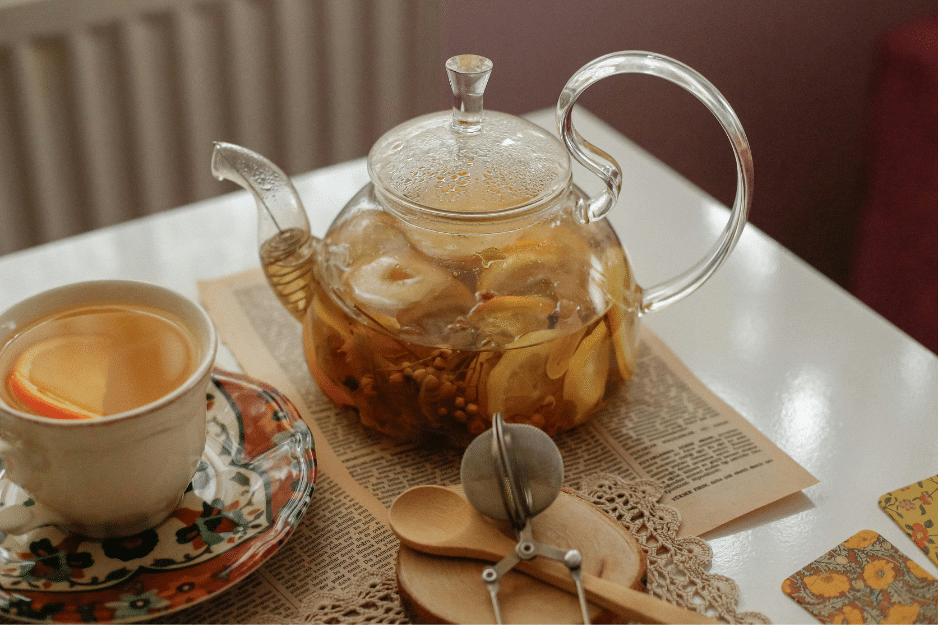
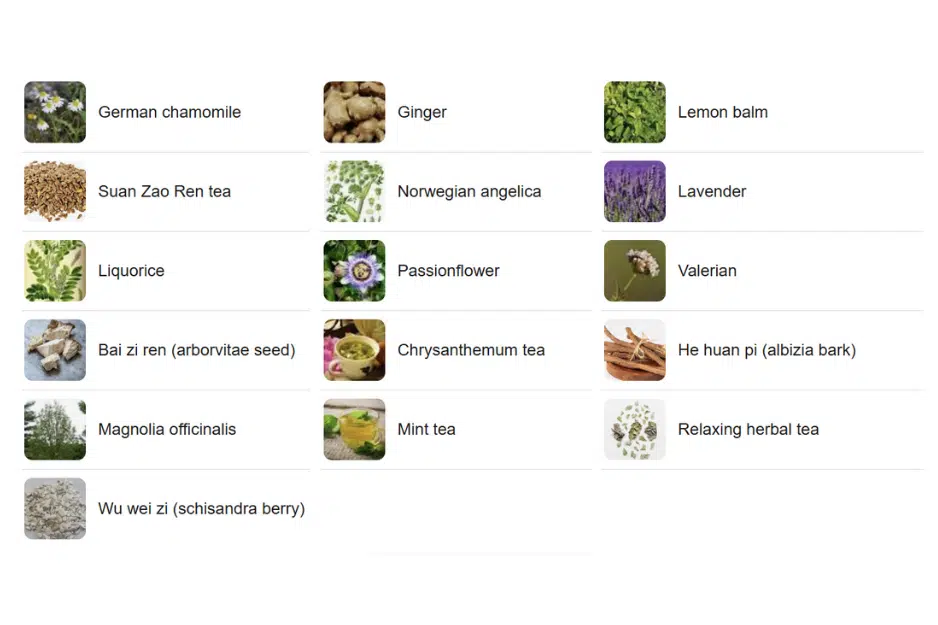
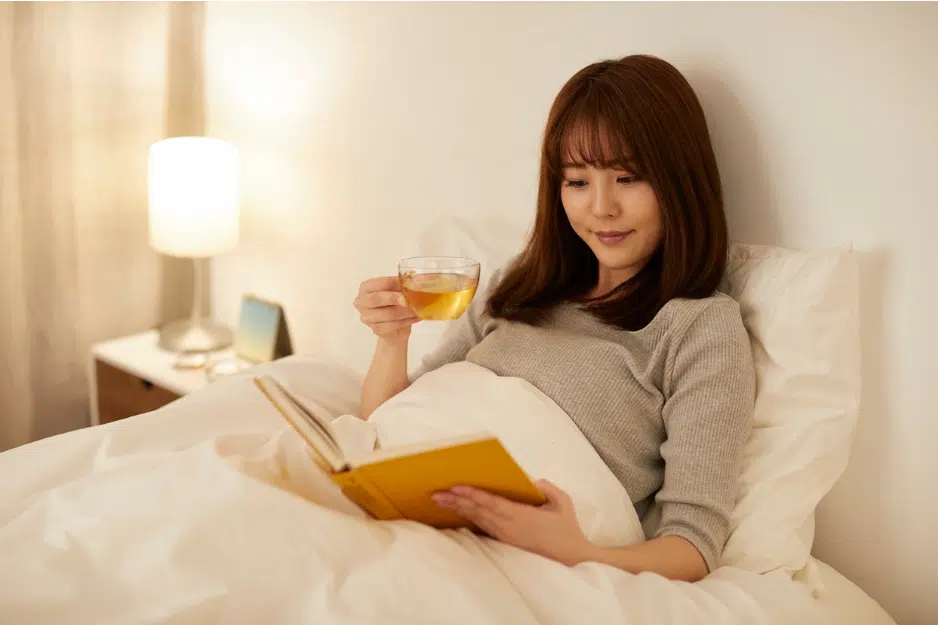
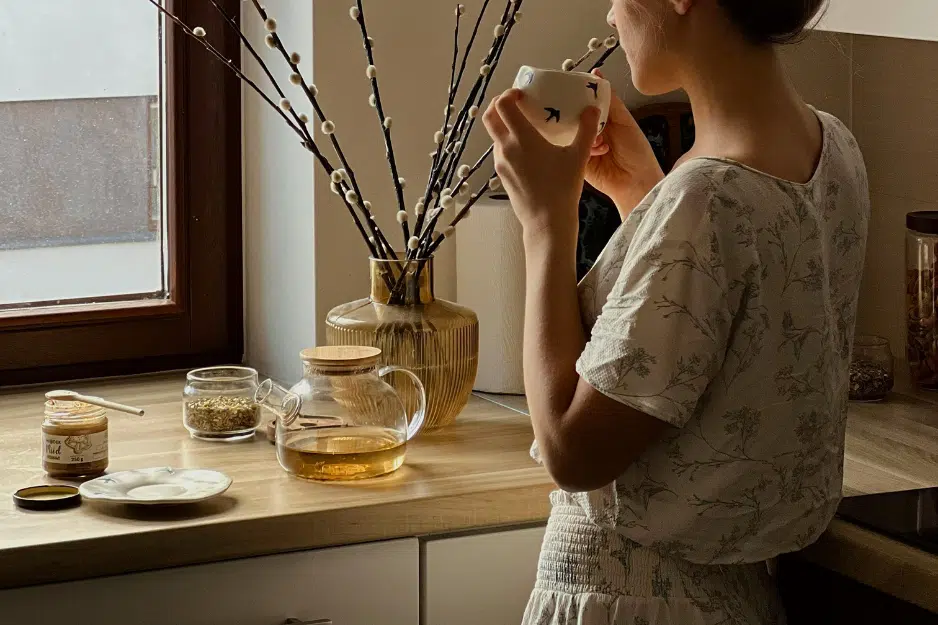
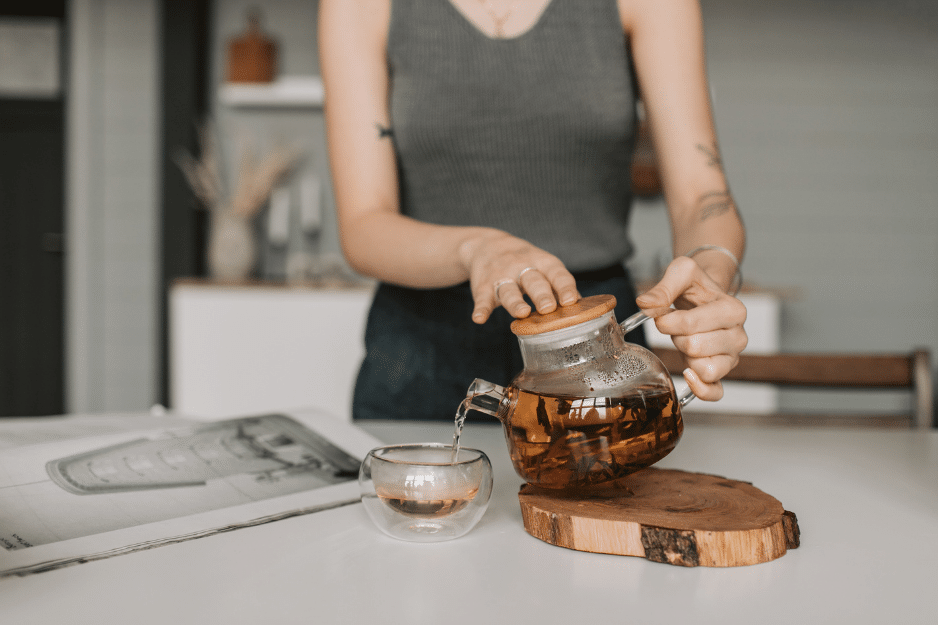
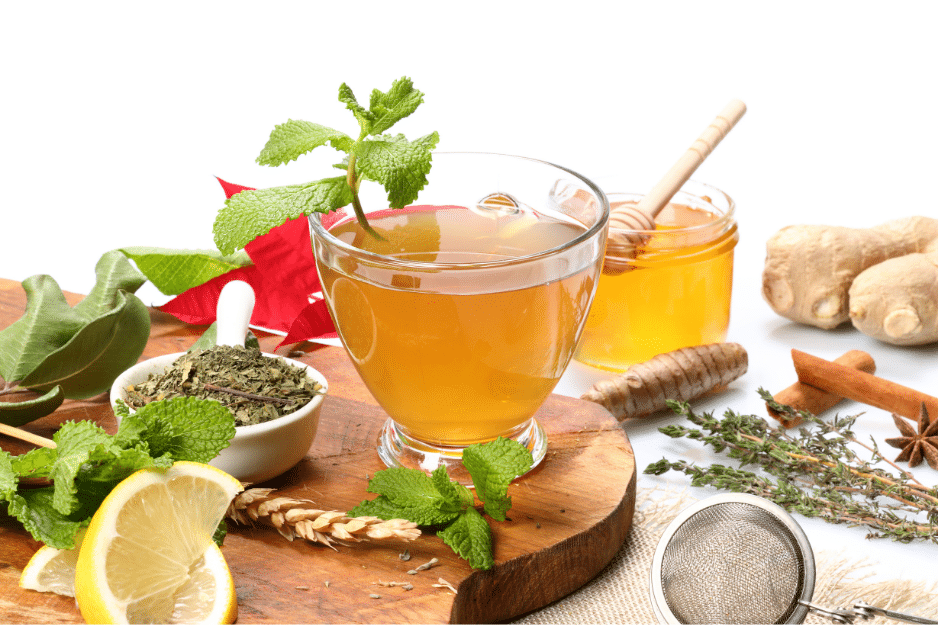
Recent Comments